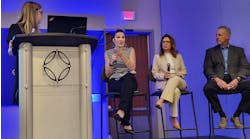Atlanta-based American Society of Heating, Refrigerating, and Air-Conditioning Engineers (ASHRAE) has provided technical guidance for proposed legislation that would shorten the depreciation of certain HVAC/R systems.
Reps. Melissa Bean (IL) and Pete Hoekstra (MI) recently introduced HR4574, which would amend the Internal Revenue Code of 1986 to provide a shorter recovery period for the depreciation of certain systems installed in nonresidential real property or residential rental property.
ASHRAE, at the request of Bean, provided language on the depreciation of HVAC/R equipment. The existing depreciation period is 39 years. The proposed legislation would reduce the period to 20 or 25 years, encouraging replacement of equipment sooner that would result in more modern/efficient equipment being installed.
"ASHRAE contributed language that would encourage building owners to replace older, less efficient HVAC/R equipment with newer, more efficient systems," says Doug Read, ASHRAE's director of government affairs. "Owners also would receive additional incentive to go beyond the minimum efficiencies required in ASHRAE/IESNA Standard 90.1. Replacing this equipment will result in significant energy savings, reduced greenhouse gas-emissions, and would encourage the retirement of older chillers that require the use of CFCs."
Reps. Melissa Bean (IL) and Pete Hoekstra (MI) recently introduced HR4574, which would amend the Internal Revenue Code of 1986 to provide a shorter recovery period for the depreciation of certain systems installed in nonresidential real property or residential rental property.
ASHRAE, at the request of Bean, provided language on the depreciation of HVAC/R equipment. The existing depreciation period is 39 years. The proposed legislation would reduce the period to 20 or 25 years, encouraging replacement of equipment sooner that would result in more modern/efficient equipment being installed.
"ASHRAE contributed language that would encourage building owners to replace older, less efficient HVAC/R equipment with newer, more efficient systems," says Doug Read, ASHRAE's director of government affairs. "Owners also would receive additional incentive to go beyond the minimum efficiencies required in ASHRAE/IESNA Standard 90.1. Replacing this equipment will result in significant energy savings, reduced greenhouse gas-emissions, and would encourage the retirement of older chillers that require the use of CFCs."
In other news, ASHRAE has lent its support to legislation to strengthen building code enforcement, the Community Building Code Administration Grant Act of 2007.
The legislation, introduced by Sen. Mary Landrieu (LA) and Rep. Dennis Moore (KS), would provide federal grants to building departments to enhance public safety. The grant would provide $100 million over 5 years to help local governments hire, train, and equip code officials, including building and fire inspectors. Moore spoke at a recent Congressional staff briefing, hosted by ASHRAE, which focused on Standards in the U.S. Economy: Energy Efficiency and Safety in Our Buildings.
Voice your opinion!
Voice your opinion!
To join the conversation, and become an exclusive member of Buildings, create an account today!
Sponsored Recommendations
Sponsored Recommendations
Latest from Industry News
Latest from Industry News
Sponsored
Sponsored

